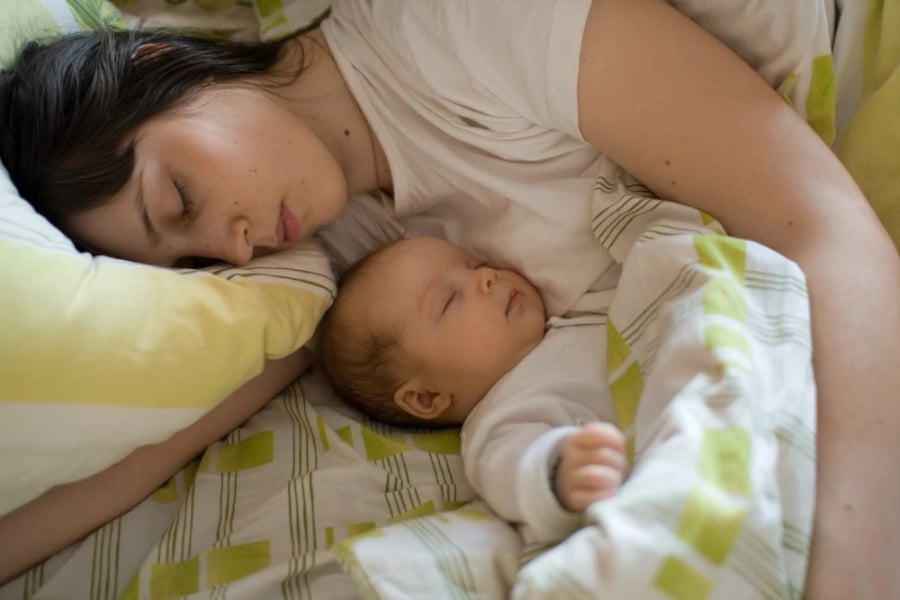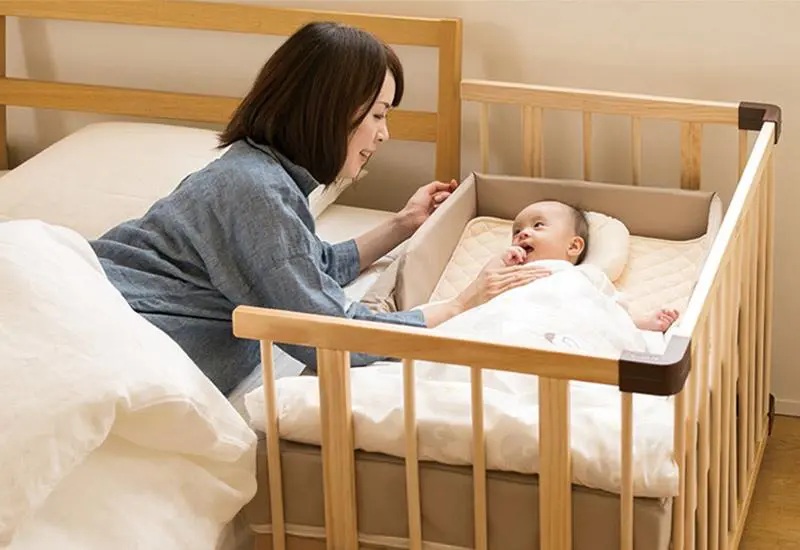Sleeping with Mom
Positive: Children who sleep in the same bed with their parents are always hugged and comforted by their mother while sleeping. For these children, this sleeping habit brings a sense of security and comfort.
Sleeping close to mom can create favorable conditions for a child’s sleep. The intimacy and safety of sleeping with mom can help the child easily transition to a deeper sleep state.

Negative: Children become dependent on their mother, have difficulty falling asleep, and have poor sleep quality. As teenagers, they may encounter additional problems such as difficulty sleeping alone and wanting to feel independent. This somewhat affects the child’s independence and autonomy.
Sleeping with mom can make the child easily influenced by external factors such as noise, movement, and the sleeping habits of adults. This can affect the quality of the child’s sleep and make it difficult for them to sleep independently in the future.
According to many studies, children from the age of 3 and above should not share a bed with their parents. At this time, the child has the ability to identify gender and is easily influenced emotionally. Not sleeping together also ensures privacy for parents and maintains family happiness.
Sleeping Alone
Positive: Good for training a child’s independence, the child gradually learns to self-soothe and fall asleep.
When a child sleeps alone, it can create a quiet and comfortable sleeping environment. This can help the child have a better sleep without being affected by noise and other factors that may occur when sleeping with someone else.
Furthermore, sleeping alone can help the child develop independence in sleep without the presence of others. This can create confidence and autonomy in managing their sleep.
Over time, the child can easily adapt to independent living, learn to handle negative emotions, and face difficulties.

Negative: Some children may feel lonely and anxious when sleeping alone, leading to difficulty sleeping and poor sleep quality. It may take some time for the child to adapt to sleeping alone and comfort themselves.
Children who never sleep with their mother may be more adaptable to independent living and have better sleep habits. However, they may encounter some difficulties in expressing emotions and intimacy with their mother because they do not have much bonding with her in the early years.
In summary, it is difficult to say which method is better. Parents should make appropriate choices based on the needs and circumstances of their child.
Things to Know About a Child’s Sleep
How much sleep does a child need in a day?
Children need more sleep than adults. If a child sleeps too little or too much, it affects their development.
A child who has just learned to walk should sleep a total of 11 to 14 hours per day. A child aged 3 to 5 needs slightly less sleep, about 11 to 13 hours. If your child is between 6 and 13 years old, they should sleep from 9 to 11 hours. Adolescents only need 8 to 10 hours of sleep, but how much they actually sleep is a different story.
Does a child need nap time?
How much a child naps during the day depends on when they sleep at night.
Most children will not need a nap during the day from the age of 5. If your child still needs a nap at this age, they will sleep less than their actual needs.
However, if a child sleeps excessively during the afternoon and evening, it is a clear sign that their night sleep is not enough in terms of quantity or quality, or both.
How to get a child to sleep?
Bedtime should not be a battle between parents and children! Build clear rules from the beginning and stick to them as a habit, even on weekends. Activities leading up to bedtime may include gently bathing the child, brushing their teeth, and using the bathroom, then ending all activities in the bedroom.
To help the child gently fall asleep, parents should plan for a relaxing activity before bedtime, such as reading a book in dim light. Do not allow the child to use electronic screens before bedtime. Also, ensure that the bedroom is dark, cool, quiet, and free of electronic screens.
For children who sleep little or have difficulty sleeping, keep the bed for sleeping only – no reading, doing homework, or playing games in bed.
Tips to Help Your Child Sleep Alone
Are you struggling to get your child to sleep in their own bed? It can be a challenge, as most children resist sleeping alone despite your best efforts. However, with patience and observation, you can find the most effective method for your child. Remember, every child is different, so it’s important to approach this matter objectively and choose a suitable approach based on their individual needs and preferences.



































